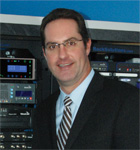I got involved in staffing partly because of my own experience. I started my career working for nationally recognized accounting firm PricewaterhouseCoopers. I would get calls frequently from recruiters claiming that they had “the perfect job” for me even though we had never met. Too often, this industry is transactional in nature—it is all about how many people are placed, rather than placing the right people. I knew there was a better way.
It begins with the staff. In starting the Tennison Group in 2004, I realized that successful placements begin with a great working environment. One way we have achieved this goal is to make it mandatory for staff to adopt a charity. This not only connects them to their own communities, but also builds a sense of community within our workplace. We will often join together and participate in a fundraising walk or event promoted by a colleague’s selected cause.
We also support these efforts financially or through volunteer service. We do other things such as paying for employees’ health-insurance premiums. In this way, staff can focus on their work, rather than worrying about health-care costs. This has made our professional culture attractive to the individuals who work here. Our atmosphere is very supportive—we’ve had instances where our entire team has rallied to help fellow workers facing tough life circumstances.
We listen to the needs of clients and candidates alike. We take the time to sit down and actually listen to the client about what they are seeking in a candidate. We take a similar approach with candidates—listening to their own preferences and goals when it comes to employers. It sounds simple but, too often in this industry, there is this tendency to just fill positions with warm bodies. Conversely, we help ensure that the right person is found for the job the first time around.
We build relationships. Creating positive, long-term working relationships—both with clients and candidates—is at the core of our success. By getting to know our clients—both inside and outside of the organizational environment—we can determine their talent requirements. We discover what candidate qualities—both professional and personal—would constitute a perfect match not only for the job but also their own workplace culture.
The same is true with candidates. We treat them as professionals. We listen to their own preferences and goals when it comes to employers. I’ve been there. I know how candidates can be shuffled around when it comes to staffing. We want the people that we recruit to be as equally pleased as our clients when it comes to placements. We also make it a point to follow up with clients to make sure that a candidate’s performance meets their expectations. If it doesn’t, we reach out to the candidate and [try]to work out any concerns or issues.
Moving forward, I think our approach is in sync with placement trends. Currently, organizations are being more careful and attentive in meeting staffing needs. Companies don’t have the time or resources to deal with candidates who are not a perfect match for them. We’ve been doing this successfully for years. In other words, they want to work with firms like the Tennison Group who have a quality rather than quantity philosophy when it comes to placement. For this reason, we are perfectly poised for the jobs marketplace—both now and in the future.


